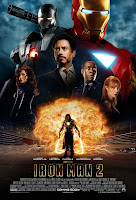Director: Jon Favreau
Starring: Robert Downey Jr, Gwyneth Paltrow, Don Cheadle, Scarlett Johansson, Sam Rockwell, Mickey Rourke, Samuel L. Jackson
I've been hanging out for Iron Man 2 for a few weeks now, so I thought I'd reward myself for finishing all my marking with an opening day screening.
Tony Stark (Downey Jr) comes under fire from the US government who want him to turn over the Iron Man weapon to the military. Stark refuses on the grounds that he has ensured peace and America's enemies are years away from being able to recreate his technology. However when Russian physicist Ivan Vanko (Rourke), who has personal motivations for wanting to take down Stark, creates a similar weapon and attacks Stark at the Monaco Grand Prix, Stark's long time friend Jim Rhodes (Cheadle, replacing Terrence Howard) has no choice but to steal one of his suits and turns it over to the military. Stark's nemesis and head of Hammer Industries, Justin Hammer (Rockwell) is called in to increase the weaponry on the suit, but what the military don't know is that Hammer has taken on Vanko as an ally.
Iron Man 2 is one of the most hotly anticipated films of the year, and it will be interesting to see how people respond to it, because there was zero expectation the first time round. It is important to remember that the first Iron Man was somewhat of a sleeper hit; Iron Man was a lower profile comic book hero compared to Batman, Superman, Spiderman and the X-Men, Robert Downey Jr. was not at the heights of fame that he is now, the support cast of Terrence Howard, Jeff Bridges and Gwyneth Paltrow was solid without being spectacular. But the incredible success of the first film, the loading up of the cast for the sequel will mean, and I guess you can add the fact that The Dark Knight changed peoples expectations of sequels, demanding they go further than originals rather than being pale imitations, all combine to suggest there is a lot of expectation on this film.
Iron Man 2 is unique as a superhero movie because one of the central themes of a superhero movie, the protection of the hero's secret identity, is not in play here. At the end of Iron Man, Stark makes an open admission that he his Iron Man. This creates an interesting situation for Favreau to explore. Stark personally has become a target, not only of the revenge driven Vanko, but also of the US government who want him to turn over the Iron Man technology to the military. His company is in disarray with all of his time being taken up being a superhero. The spotlight and praise that being Iron Man has heaped on him has seen Stark's already healthy ego spiral out of control. In all, Iron Man 2 presents a rather compelling argument for the maintaining of a secret identity.
This film has to have one of the most decorated comic book/superhero movie casts ever assembled. Paltrow is an Oscar winner. Downey Jr, Cheadle, Rourke and Jackson are all Oscar nominees. Rockwell and Johansson are no slouches in the talent department either. Robert Downey Jr is again the star of the show here. Despite so much going on in this film, Favreau does a good job of keeping Stark at the centre of things. Downey Jr rediscovers the lovable rascal Stark, a performance which was such a key to the success of the first film. Rourke is compelling as Vanko, allowing the audience to forgive some of the more ridiculous aspects of his character (the guy gets continuously rammed against the wall by a car, not wearing any armour, and in the next scene is uninjured). Rockwell also deserves a mention for his scene stealing performance as Tony's corporate nemesis Hammer.
Iron Man 2 does not really fit the formula that Star Wars established in regards to the tone of a trilogy. The Empire Strikes Back was a much darker film than the original Star Wars and this pattern has been followed in numerous trilogies since then. Other notably darker second installments include Indiana Jones and the Temple of Doom, Pirates of the Caribbean: Dead Man's Chest, X-Men 2, even Back to the Future Part 2 is darker. While Iron Man 2 threatens to go there early on as we see Stark spiralling out of control, the tone of the film never actually changes. It is always fun, never dark. Favreau's humour continues to shine through with the constant string of one liners.
Without doubt, one of the feel good stories of 2008 was the comeback of Mickey Rourke in The Wrestler, earning him an Best Actor Oscar nomination. Iron Man 2 couples him with Robert Downey Jr, another star who managed to resurrect their career after hitting rock bottom. Downey Jrs career has never looked stronger and I couldn't help but thinking Rourke could only wish his return would work out the same way. Then I remembered that Robert Downey Jr is handsome, charismatic and charming, whereas Mickey Rourke, as talented as he is, has a face like a smashed crab. You could probably say that his two big films since his return probably sum up the avenues that are open to him now. He can either play weathered old warriors (The Wrestler) or comic book villains (Iron Man 2). You're not going to see him playing a romantic lead.
It lacks a bit of the charm and magic of the original, and the ending is a bit anticlimactic, not to mention very similar to the finale of the first film (super robots fighting each other), but Iron Man 2 is still a very enjoyable movie and I'm sure will make more than enough money to ensure the franchise continues.












